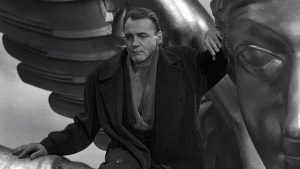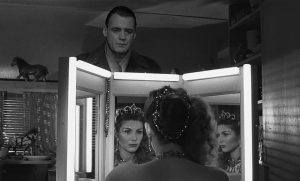Wings of Desire (1987)

Wings of Desire (1987), directed by Wim Wenders, is widely regarded as one of the most poetic and visually stunning films in cinema history. Set in Berlin during the Cold War, the film combines themes of existential longing, love, and the human condition, offering a deeply philosophical exploration of life from the perspective of immortal beings.
Plot Overview
The story centers on two angels, Damiel (Bruno Ganz) and Cassiel (Otto Sander), who wander the city of Berlin, observing the lives of its human inhabitants. Invisible to humans, they listen to their thoughts and witness their struggles, joys, and pains. Damiel, however, grows weary of his eternal, detached existence and yearns to experience life as a human. His desire intensifies when he falls in love with Marion (Solveig Dommartin), a lonely trapeze artist. The film follows Damiel’s journey as he chooses to give up his immortality for the chance to experience love and the tangible, fleeting beauty of human existence.
Themes and Symbolism
•Angels and Humanity: The angels symbolize eternal observers, representing a divine yet unfeeling perspective on life. In contrast, humans experience the full spectrum of emotions, both painful and beautiful, making their lives uniquely precious.
•Berlin as a Metaphor: The divided city serves as a backdrop, mirroring the themes of separation and longing. The Berlin Wall, visible in the film, underscores the physical and emotional barriers between people.
•Existential Reflection: The film delves into profound philosophical questions about existence, mortality, and the nature of happiness.
Visual and Cinematic Style
The cinematography, by Henri Alekan, is a masterpiece in itself. The film alternates between monochrome and color, with black-and-white representing the angels’ detached, timeless perspective, and color symbolizing the vivid, chaotic vibrancy of human life. The transitions between these styles are seamless and emotionally resonant.
Wenders uses long, meditative shots and fluid camera movements to create a dreamlike atmosphere. The film’s pacing is deliberate, allowing viewers to absorb its philosophical depth and visual beauty.
Performances
Bruno Ganz delivers a quietly powerful performance as Damiel, capturing the angel’s deep yearning and gentle curiosity about humanity. Solveig Dommartin as Marion exudes vulnerability and strength, embodying the essence of human struggle and hope. Peter Falk, playing himself as a former angel turned human, adds a touch of warmth and humor to the film.
Legacy
“Wings of Desire” received critical acclaim upon its release and remains a landmark in world cinema. It inspired a less successful American remake, “City of Angels” (1998), but Wenders’ original remains unparalleled in its artistic and emotional impact. The film has influenced countless filmmakers and is a testament to the power of cinema as a medium for exploring universal truths.
Conclusion
“Wings of Desire” is a contemplative, deeply moving film that transcends genres. Its exploration of the human experience, combined with its poetic visuals and profound themes, makes it an enduring classic. It is not just a film to watch but one to ponder and feel, resonating long after the credits roll.











